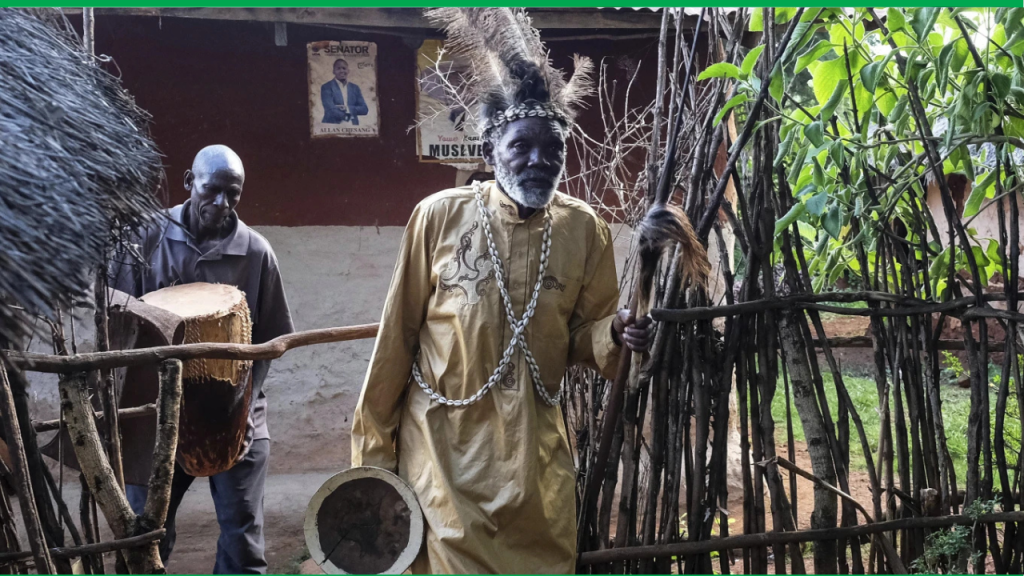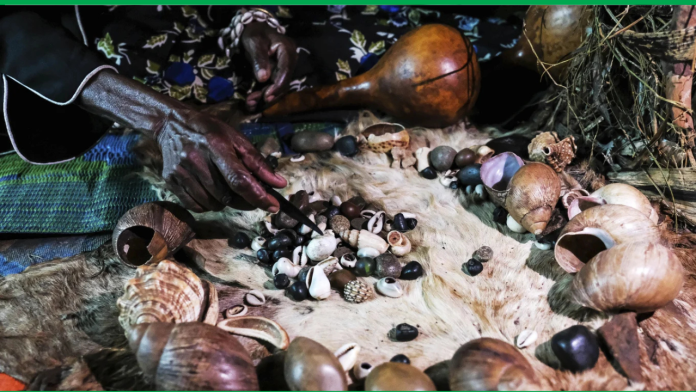When Wilson Watira extended his hand at a funeral to greet his political rival, he expected a firm handshake. Instead, the man picked up the funeral program, folded it into a barrier, and used it to make brief contact—avoiding Watira’s skin entirely.
“He just looked at me and folded the program,” Watira recounted. “He greeted me with paper. He’s afraid of me—but only because I’m not afraid of him.”
Watira, a candidate for Uganda’s Parliament and a prominent leader among the Bamasaba people, sees the incident as a vivid example of how deeply the fear of witchcraft runs in Uganda’s political culture. In a country where campaign trails are marked by festive parades, hired cars, and cash handouts, the true battleground for power often lies in the unseen—within rituals, shrines, and spiritual maneuvering.
Behind the cheers and posters, politics in Uganda, like much of Africa, can become intensely spiritual. According to Watira and other sources who spoke with The Associated Press, traditional rituals, protective charms, and visits to witch doctors are quietly seen by many as essential campaign tools.
The opponent who refused to touch Watira may have feared that a simple handshake could hand over spiritual power—or unleash a curse.
“When your mind is pushed to that level, everything becomes suspicious,” Watira said. “You start imagining things. That’s the real challenge we face.”
Religion, Rituals, and the Political Soul
Uganda’s political spirituality is part of a broader national contradiction: Christianity dominates public life, yet traditional religious practices continue to thrive in private. Many voters and politicians attend church on Sundays, but also consult traditional healers in secret, seeking divine favor or mystical protection.
Church leaders frequently condemn the practice as incompatible with Christian belief. But in much of sub-Saharan Africa, these two worlds—modern religion and ancestral traditions—exist in uneasy coexistence.
And when political stakes are high, the spiritual intensity only grows.
In Kenya, protesters in Nairobi recently claimed they felt strange and disoriented near State House—possibly, they said, the effect of a spell protecting President William Ruto. He’s also come under fire for building a church within the state compound, which critics describe as more shrine than sanctuary.
In South Sudan, Vice President Riek Machar believes he fulfills a century-old prophecy of a “left-handed man with gapped teeth” destined to unite the nation. That belief, some argue, helps fuel his long and bloody rivalry with President Salva Kiir.
In Zambia, two men are currently on trial for allegedly using witchcraft to harm President Hakainde Hichilema. Ironically, Hichilema himself was once accused by his predecessor, Michael Sata, of relying on charms from his home region.
A Booming Industry of the Occult
In Uganda’s capital, Kampala, lampposts are cluttered with flyers offering magical solutions: “Win back your lover,” “Catch a thief,” and increasingly, “Secure your political victory.”
“Across all communities in Uganda, there is an overwhelming reliance on witch doctors—especially by politicians,” said Steven Masiga, a researcher and cultural leader in Mbale. “Witch doctors are making a killing.”
According to Masiga, political candidates are now budgeting for spiritual services alongside posters and rallies. One politician in his area reportedly skinned a goat alive—without killing it—on the advice of a witch doctor. He went on to win the election.
Even President Yoweri Museveni, who has ruled Uganda for nearly 40 years, has acknowledged the role of traditional rituals. In a speech last year, he described jumping over a slaughtered chicken three times as part of a spiritual ritual during his bush war days in the 1980s.
“Traditional religion is very strong,” Museveni said, urging Christian leaders to stop antagonizing healers. “We had a very good relationship with them.”
Still, politicians rarely speak publicly about their spiritual consultations, for fear of ridicule or backlash. But the rumors persist.
In 2016, then-parliamentary speaker Rebecca Kadaga drew headlines after being photographed entering a shrine linked to her clan. The Anglican archbishop criticized her, but Kadaga defended her actions: “Who doesn’t have roots? I was informing my ancestors of my political success.”
Inside the Shrines of Influence

In Mbale, a town where age-old customs like ritual circumcision still hold deep cultural significance, traditional healer Rose Mukite continues to serve a growing clientele—many of them politicians.
Inside her igloo-shaped shrine, clients must crouch to enter. She consults cowrie shells, shakes calabashes, and smokes a tobacco pipe while interpreting spiritual signs. Mukite claims her practice began in 1980, after she was possessed by a spirit she had to tame in order to gain her powers.
“I have many, many clients,” she said.
Politicians, she added, often come seeking protection—chewing sacred tree bark, for example, to avoid jail or defeat. Still, she offers no guarantees.
“I can’t say I succeed with everything,” she said. “Just like a hospital—sometimes death still comes.”
Faithful, But Fearful
Peace Khalayi, a Catholic campaigning for a women’s seat in Parliament, says she’s had to repeatedly deflect suggestions to visit a witch doctor. While willing to pay respect to elders or local traditions, she draws a firm line when it comes to rituals like animal sacrifice.
Supporters still nudge her toward spiritual options. “You tell them, ‘We’ll go.’ You pretend to agree, but you don’t actually show up,” she said.
Even so, she admits that the fear lingers.
“That fear is real,” she said. “When you have an opponent, you might want to be open with them—but something inside holds you back.”
By AP News



